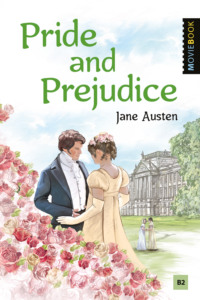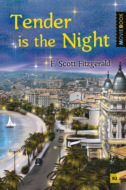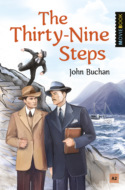Kitabı oku: «Pride and Prejudice / Гордость и предубеждение», sayfa 3
Chapter 9
Elizabeth passed the night in her sister's room, and in the morning had the pleasure of being able to send a tolerable answer to the inquiries which she very early received from Mr. Bingley by a housemaid. In spite of this, however, she requested to have a note sent to Longbourn, desiring her mother to visit Jane, and form her own judgement of her situation. The note was immediately sent, and Mrs. Bennet, accompanied by her two youngest girls, reached Netherfield soon after the family breakfast.
If she had found Jane in any apparent danger, Mrs. Bennet would have been very miserable; but as her illness was not alarming, she had no wish of her recovering immediately, as her restoration to health would probably remove her from Netherfield. She did not want to listen, therefore, to her daughter's proposal of being carried home. Neither did the apothecary, who arrived about the same time, think it at all advisable. Soon the mother and three daughters were invited by Miss Bingley into the breakfast parlour. Mr. Bingley met them with hopes that Mrs. Bennet had not found Miss Bennet worse than she expected.
“Indeed I have, sir,” was her answer. “She is too ill to be moved. Mr. Jones says we must not think of moving her. We must trespass a little longer on your kindness.”50
“Removed!” cried Bingley. “It must not be thought of. My sister, I am sure, will not hear of her removal.”
“You may depend upon it, Madam,” said Miss Bingley, with cold politeness, “that Miss Bennet will receive every possible attention while she remains with us.”
“I am sure,” Mrs. Bennet said, “if it was not for such good friends I do not know what would become of her, for she is very ill indeed, and suffers a vast deal, though with the greatest patience in the world, for she has the sweetest temper I have ever met with. I often tell my other girls they are nothing to her. You have a sweet room here, Mr. Bingley, and a charming prospect over the gravel walk. I do not know a place in the country that is equal to Netherfield. You will not think of quitting it in a hurry, I hope, though you have a short lease.”
“Whatever I do is done in a hurry,” replied he; “and therefore if I resolve to quit Netherfield, I would probably be off in five minutes. At present, however, I consider myself as quite fixed here.”
“That is exactly what I have supposed of you,” said Elizabeth.
“You begin to comprehend me, do you?” cried he, turning towards her.
“Oh! Yes – I understand you perfectly.”
“I wish I might take this for a compliment; but to be so easily seen through I am afraid is pitiful.”
“That is as it happens. It does not mean that a deep, complicated character is more or less admirable than such a one as yours.”
“I did not know before,” said Bingley immediately, “that you were a studier of character. It must be an amusing study.”
“Yes, but complicated characters are the most amusing. They have at least that advantage.”
“The country,” said Darcy, “can in general supply not many subjects for such a study. In a country neighbourhood you move in a very confined and unvarying society.”
“But people themselves alter so much, that there is something new to be observed in them all the time.”
“Yes, indeed,” cried Mrs. Bennet, offended by his manner of mentioning a country neighbourhood. “I cannot see that London has any great advantage over the country, for my part, except the shops and public places. The country is a vast deal pleasanter, is it not, Mr. Bingley?”
“When I am in the country,” he replied, “I never wish to leave it; and when I am in town it is pretty much the same. They have each their advantages, and I can be equally happy in either.”
“That is because you have the right disposition. But that gentleman,” looking at Darcy, “seemed to think the country was nothing at all.”
“Indeed, Mamma, you are mistaken,” said Elizabeth, blushing for her mother. “You quite mistook Mr. Darcy. He only meant that there was not such a variety of people to be met with in the country as in the town, which you must acknowledge to be true.”
“Certainly, my dear, nobody said there were; but as to not meeting with many people in this neighbourhood, I believe there are few neighbourhoods larger. I know we dine with four-and-twenty families.”
Nothing but concern for Elizabeth could enable Bingley to keep his countenance51. His sister was less delicate, and directed her eyes towards Mr. Darcy with a very expressive smile. Elizabeth, for the sake of saying something that might turn her mother's thoughts52, now asked her if Charlotte Lucas had been at Longbourn since her coming away.
“Yes, she called yesterday with her father. What an agreeable man Sir William is, Mr. Bingley, is not he? So much the man of fashion! So polite and easy! He had always something to say to everybody. That is my idea of good breeding; and those persons who fancy themselves very important, and never open their mouths, quite mistake the matter.”
“Did Charlotte dine with you?”
“No, she went home. I fancy she was wanted about the cooking. For my part, Mr. Bingley, I always keep servants that can do their own work; my daughters are brought up very differently. But everybody is to judge for themselves, and the Lucases are a very good sort of girls, I assure you. It is a pity they are not handsome! Not that I think Charlotte so very plain – but then she is our particular friend.”
“She seems a very pleasant young woman.”
“Oh, yes; but you must admit she is very plain. Lady Lucas herself has often said so, and envied me Jane's beauty. I do not like to boast of my own child, but to be sure, Jane – one does not often see anybody better looking. It is what everybody says. I do not trust my own partiality. When she was only fifteen, there was a man at my brother Gardiner's in town so much in love with her that my sister-in-law was sure he would make her an offer before we came away. But, however, he did not. Perhaps he thought her too young. However, he wrote some verses on her, and very pretty they were.”
“And so ended his affection,” said Elizabeth impatiently. “There has been many a one, I fancy, overcome in the same way.53 I wonder who first discovered the ability of poetry to drive away love!”
“I have been used to consider poetry as the food of love,” said Darcy.
“Of a fine, stout, healthy love it may. Everything nourishes what is strong already. But if it is only a slight, thin sort of inclination, I am convinced that one good sonnet will starve54 it entirely.”
Darcy only smiled. Mrs. Bennet longed to speak, but could think of nothing to say; and after a short silence she began repeating her thanks to Mr. Bingley for his kindness to Jane, with an apology for troubling him also with Lizzy. Mr. Bingley was very polite in his answer, and forced his younger sister to be polite also. Mrs. Bennet was satisfied, and soon afterwards ordered her carriage. Upon this signal, the youngest of her daughters put herself forward. The two girls had been whispering to each other during the whole visit, and the result of it was, that the youngest should remind Mr. Bingley of his promise to give a ball at Netherfield.
Lydia was a stout, well-grown girl of fifteen, with a fine complexion; a favourite with her mother, whose affection had brought her into public at an early age.
She addressed Mr. Bingley on the subject of the ball, and abruptly reminded him of his promise; adding, that it would be the most shameful thing in the world if he did not keep it. His answer to this sudden attack was delightful to their mother's ear:
“I am perfectly ready, I assure you, to keep my engagement; and when your sister is recovered, you will name the day of the ball. But you would not wish to be dancing when she is ill.”
Lydia declared herself satisfied. “Oh, yes – it would be much better to wait till Jane was well, and by that time most likely Captain Carter would be at Meryton again. And when you have given your ball,” she added, “I will insist on their giving one also. I will tell Colonel Forster it will be quite a shame if he does not.”
Mrs. Bennet and her daughters then departed, and Elizabeth returned instantly to Jane, leaving her own and her relations' behaviour to the remarks of the two ladies and Mr. Darcy; the latter of whom, however, could not be prevailed on to join in their censure of her, in spite of all Miss Bingley's witticisms on fine eyes.
Chapter 10
The day passed much as the day before had done. Mrs. Hurst and Miss Bingley had spent some hours of the morning with the invalid, who continued, though slowly, to mend; and in the evening Elizabeth joined their party in the drawing-room. The loo-table, however, did not appear. Mr. Darcy was writing, and Miss Bingley, seated near him, was watching the progress of his letter and repeatedly calling off his attention by messages to his sister. Mr. Hurst and Mr. Bingley were at piquet55, and Mrs. Hurst was observing their game.
Elizabeth took up some needlework, and was sufficiently amused in attending to what passed between Darcy and his companion. The perpetual praises of the lady, either on his handwriting, or on the evenness of his lines, or on the length of his letter, with the perfect indifference with which her praises were received, formed a curious dialogue, and was exactly in union with her opinion of each.
“How delighted Miss Darcy will be to receive such a letter!”
He made no answer.
“You write uncommonly fast.”
“You are mistaken. I write rather slowly.”
“Pray tell your sister that I long to see her.”
“I have already told her so once, by your desire.”
“I am afraid you do not like your pen. Let me mend it for you. I mend pens remarkably well.”
“Thank you – but I always mend my own.”
“How can you contrive to write so even?”
He was silent.
“Do you always write such charming long letters to your sister, Mr. Darcy?”
“They are generally long; but whether always charming it is not for me to determine.”
When the letter was over, he asked Miss Bingley and Elizabeth for some music. Miss Bingley moved with some eagerness to the pianoforte and seated herself.
Mrs. Hurst sang with her sister, and while they were thus employed, Elizabeth could not help observing, as she turned over some music-books that lay on the instrument, how frequently Mr. Darcy's eyes were fixed on her. She hardly knew how to suppose that she could be an object of admiration to him; and yet that he looked at her because he disliked her, was still more strange. She could only imagine, however, at last that she drew his notice because there was something more wrong, according to his ideas of right, than in any other person present. The supposition did not pain her. She liked him too little to care for his approval.
After playing some Italian songs, Miss Bingley began playing a lively Scotch air; and soon afterwards Mr. Darcy, coming up to Elizabeth, said to her:
“Do not you feel a great inclination, Miss Bennet, to seize such an opportunity of dancing a reel56?”
She smiled, but made no answer. He repeated the question, with some surprise at her silence.
“Oh!” said she, “I heard you before, but I could not immediately determine what to say in reply. You wanted me, I know, to say 'Yes,' that you might have the pleasure of despising my taste; but I always delight in overthrowing those kind of schemes, and cheating a person of their premeditated contempt. I have, therefore, made up my mind to tell you, that I do not want to dance a reel at all – and now despise me if you dare.”
“Indeed I do not dare.”
Elizabeth, having rather expected to affront him, was amazed at his gallantry; but there was a mixture of sweetness and playfulness in her manner which made it difficult for her to affront anybody; and Darcy had never been so bewitched by any woman as he was by her. He really believed, that were it not for the inferiority of her connections,57 he would be in some danger.
Miss Bingley saw, or suspected enough to be jealous.
She often tried to provoke Darcy into disliking her guest, by talking of their supposed marriage, and planning his happiness in such an alliance.
“I hope,” said she, as they were walking together near the house the next day, “you will give your mother-in-law a few hints, when this desirable event takes place, as to the advantage of holding her tongue58; and our the younger girls of running after officers59. And, if I may mention such a delicate subject, endeavour to check60 that trait, bordering on pride and impudence, which your lady possesses.”
“Have you anything else to propose for my domestic felicity?”
“Oh, yes! Let the portraits of your uncle and aunt Phillips be placed in the gallery at Pemberley. Put them next to your great-uncle the judge. They are in the same profession, you know, only in different lines. As for your Elizabeth's picture, you must not have it taken, for what painter could do justice to those beautiful eyes?”
“It would not be easy, indeed, to catch their expression, but their colour and shape, and the eyelashes, so remarkably fine, might be copied.”
At that moment they were met from another walk by Mrs. Hurst and Elizabeth herself.
“I did not know that you intended to walk,” said Miss Bingley, in some confusion.
“You ran away without telling us that you were coming out,” answered Mrs. Hurst.
Then taking the disengaged arm of Mr. Darcy, she left Elizabeth to walk by herself. The path just admitted three. Mr. Darcy felt their rudeness, and immediately said:
“This walk is not wide enough for our party. We had better go into the avenue.”
But Elizabeth, who had not the least inclination to remain with them, laughingly answered:
“No, no; stay where you are. You are charmingly grouped. The picturesque would be spoilt by admitting a fourth. Good-bye.”
She then ran gaily off.
Chapter 11
When the ladies removed after dinner, Elizabeth ran up to her sister, and seeing her well guarded from cold, attended her into the drawing-room, where she was welcomed by her two friends with pleasure; and Elizabeth had never seen them so agreeable as they were during the hour which passed before the gentlemen appeared.
But when the gentlemen entered, Jane was no longer the first object; Miss Bingley's eyes were instantly turned toward Darcy. He addressed himself to Miss Bennet, with a polite congratulation; Mr. Hurst also made her a slight bow, and said he was “very glad.” Bingley was full of joy and attention. She removed at his desire to the other side of the fireplace, that she might be further from the door. He then sat down by her, and talked scarcely to anyone else. Elizabeth, at work in the opposite corner, saw it all with great delight.
When tea was over, Mr. Hurst stretched himself on one of the sofas and went to sleep. Darcy took up a book; Miss Bingley did the same; and Mrs. Hurst, principally occupied in playing with her bracelets and rings, joined now and then in her brother's conversation with Miss Bennet.
Miss Bingley's attention was quite as much engaged in watching Mr. Darcy's progress through his book, as in reading her own; and she was perpetually either making some inquiry, or looking at his page. She could not win him, however, to any conversation; he merely answered her question, and read on. At length, quite exhausted by the attempt to be amused with her own book, which she had only chosen because it was the second volume of his, she gave a great yawn and said, “How pleasant it is to spend an evening in this way! I declare there is no enjoyment like reading! How much sooner one tires of anything than of a book! When I have a house of my own, I will be miserable if I have not an excellent library.”
No one made any reply. She then yawned again, threw aside her book, and cast her eyes round the room in quest for some amusement. She got up and walked about the room. Her figure was elegant, and she walked well; but Darcy, at whom it was all aimed, was still inflexibly studious. In the desperation of her feelings, she resolved on one effort more, and, turning to Elizabeth, said:
“Miss Eliza Bennet, let me persuade you to follow my example, and take a turn about the room. I assure you it is very refreshing after sitting so long in one attitude.”
Elizabeth was surprised, but agreed to it immediately. Miss Bingley succeeded in the real object of her politeness; Mr. Darcy looked up, and unconsciously closed his book. He was directly invited to join their party, but he declined it, observing that he could imagine but two motives for their choosing to walk up and down the room together, with either of which motives his joining them would interfere. “What could he mean? She was dying to know what could be his meaning?” – and asked Elizabeth whether she could at all understand him?
“Not at all,” was her answer; “but he means to be severe on us, and our surest way of disappointing him will be to ask nothing about it.”
Miss Bingley, however, was incapable of disappointing Mr. Darcy in anything, and persevered therefore in requiring an explanation of his two motives.
“I have not the smallest objection to explaining them,” said he, as soon as she allowed him to speak. “You either choose this method of passing the evening because you have secret affairs to discuss, or because you are conscious that your figures appear to the greatest advantage in walking; if the first, I would be completely in your way, and if the second, I can admire you much better as I sit by the fire.”
“Oh! Shocking!” cried Miss Bingley. “I never heard anything so offensive. How shall we punish him for such a speech?”
“Nothing so easy, if you have but the inclination,” said Elizabeth. “We can all punish one another. Tease him – laugh at him. Intimate as you are, you must know how it is to be done.”
“But upon my honour,61 I do not. I assure you that my intimacy has not yet taught me that. Tease calmness of manner and presence of mind! No, no. And as to laughter, we will not expose ourselves, if you please, by attempting to laugh without a subject.”
“Mr. Darcy is not to be laughed at!” cried Elizabeth. “That is an uncommon advantage, and uncommon I hope it will continue, for it would be a great loss to me to have many such acquaintances. I dearly love a laugh.”
“Miss Bingley,” said he, “has given me more credit than can be. The wisest and the best of men – no, the wisest and best of their actions – may be rendered ridiculous by a person whose first object in life is a joke.”
“Certainly,” replied Elizabeth —”there are such people, but I hope I am not one of them. I hope I never ridicule what is wise and good. Follies and nonsense, whims and inconsistencies, do divert me, I admit, and I laugh at them whenever I can. But these, I suppose, are precisely what you are without.”
“Perhaps that is not possible for anyone. But it has been the study of my life to avoid those weaknesses which often expose a strong understanding to ridicule.”
“Such as vanity and pride.”
“Yes, vanity is a weakness indeed. But pride – where there is a real superiority of mind, pride will be always under good regulation.”
Elizabeth turned away to hide a smile.
“Your examination of Mr. Darcy is over, I presume,” said Miss Bingley; “and pray what is the result?”
“I am perfectly convinced by it that Mr. Darcy has no defect. He admits it himself without disguise.”
“No,” said Darcy, “I have made no such pretension. I have faults enough, but they are not, I hope, of understanding. My temper I dare not vouch for. I cannot forget the follies and vices of others so soon as I ought, nor their offenses against myself. My temper would perhaps be called resentful. My good opinion once lost, is lost forever.”
“That is a failing indeed!” cried Elizabeth. “Cruel resentment is a shade in a character. But you have chosen your fault well. I really cannot laugh at it. You are safe from me.”
“There is, I believe, in every disposition a tendency to some particular evil – a natural defect, which not even the best education can overcome.”
“And your defect is to hate everybody.”
“And yours,” he replied with a smile, “is willfully to misunderstand them.”
“Let us have a little music,” cried Miss Bingley, tired of a conversation in which she had no share. “Louisa, you will not mind my waking Mr. Hurst?”
Her sister had not the smallest objection, and the pianoforte was opened; and Darcy was not sorry for it. He began to feel the danger of paying Elizabeth too much attention.








